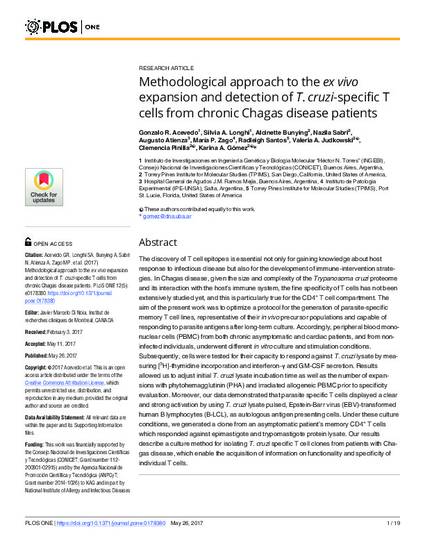
- T cells,
- Trypanosoma cruzi,
- Chagas disease,
- Memory T cells,
- Antigen-presenting cells,
- Parasitic diseases,
- Secretion,
- Epstein-Barr virus
The discovery of T cell epitopes is essential not only for gaining knowledge about host response to infectious disease but also for the development of immune-intervention strategies. In Chagas disease, given the size and complexity of the Trypanosoma cruzi proteome and its interaction with the host’s immune system, the fine specificity of T cells has not been extensively studied yet, and this is particularly true for the CD4+ T cell compartment. The aim of the present work was to optimize a protocol for the generation of parasite-specific memory T cell lines, representative of their in vivo precursor populations and capable of responding to parasite antigens after long-term culture. Accordingly, peripheral blood mononuclear cells (PBMC) from both chronic asymptomatic and cardiac patients, and from non-infected individuals, underwent different in vitro culture and stimulation conditions. Subsequently, cells were tested for their capacity to respond against T. cruzi lysate by measuring [3H]-thymidine incorporation and interferon-γ and GM-CSF secretion. Results allowed us to adjust initial T. cruzi lysate incubation time as well as the number of expansions with phytohemagglutinin (PHA) and irradiated allogeneic PBMC prior to specificity evaluation. Moreover, our data demonstrated that parasite specific T cells displayed a clear and strong activation by using T. cruzi lysate pulsed, Epstein-Barr virus (EBV)-transformed human B lymphocytes (B-LCL), as autologous antigen presenting cells. Under these culture conditions, we generated a clone from an asymptomatic patient’s memory CD4+ T cells which responded against epimastigote and trypomastigote protein lysate. Our results describe a culture method for isolating T. cruzispecific T cell clones from patients with Chagas disease, which enable the acquisition of information on functionality and specificity of individual T cells.
Available at: http://works.bepress.com/radleigh-santos/27/

31 Aug 2017: Acevedo GR, Longhi SA, Bunying A, Sabri N, Atienza A, et al. (2017)Correction: Methodological approach to the ex vivo expansion and detection of T. cruzi-specific T cells from chronic Chagas disease patients. PLOS ONE 12(8): e0184467.https://doi.org/10.1371/journal.pone.0184467 View correction
Copyright: © 2017 Acevedo et al. This is an open access article distributed under the terms of the Creative Commons Attribution License, which permits unrestricted use, distribution, and reproduction in any medium, provided the original author and source are credited.